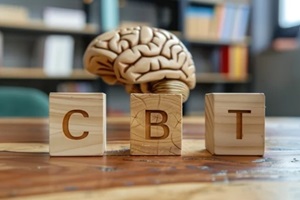
Individual therapy can offer many benefits, from overcoming trauma to mapping unwanted behaviors, and finding more suitable replacements. However, an area often overlooked for growth—and where therapy proves invaluable—is understanding and managing emotions.
A person’s emotions can significantly influence the decisions they make and how they view the world, both positively and negatively. By understanding your feelings, you can gain control of your emotions and work toward becoming the person you aspire to be.
One of the goals of individual therapy is to equip a person with the tools they need to succeed. Here’s how individual therapy facilitates emotional growth, helping patients to develop the emotional toolkit to name their challenges and view them from a new perspective.
Understanding Individual Therapy
Every person is unique, which means the method of therapy that works best for one may differ from another’s needs. Individual therapy may involve one or more strategies or approaches, including:
Cognitive Behavioral Therapy
One of the most common types of modern therapy, CBT is focused on identifying how a person feels, why they feel this way, and how those feelings shape their engagement with the world. Because CBT attends to a patient’s emotional state, it is well suited for emotional growth.
It may include a therapist who creates space to pause and examine how thoughts influence emotions, leading to actions that, in turn, affect thoughts, creating a continuous cycle.
For instance, suppose that you are going to a job interview but are unsure where the office is. You may feel some anxiety on the day of the interview, and that is normal. However, if that anxiety accelerates into panic, this is a distortion of an emotion or thought that is no longer serving you.

CBT (also known as cognitive reappraisal) can teach you how to identify your situation (“I am panicking because I do not know what to do”) and find the elements of distortion or falsehood that are making the emotion uncontrolled (“I will not be able to find the office when I arrive at the address”/“The interviewer will think I do not care about the job and refuse to see me”).
There is no evidence that these claims are true, and cognitive reappraisal can teach you to identify and disprove them (“The job is located at a business that surely has signage to attract customers; I can find it”) for better emotional growth.
Humanistic Therapy
The center of humanistic therapy is on the person and the knowledge about themselves that only they can know. The goal is to improve a person’s acceptance of themselves by analyzing their feelings and where those emotions come from. The therapist might ask the person to share stories about their life, listening without speaking, in order to gather information to later share with the patient.
Psychodynamic Therapy
Perhaps the most common type of therapy, psychodynamic therapy, is a form of talk therapy in which a patient is free to share anything that comes to mind. Over time, the therapist can begin to identify negative patterns and illuminate these thought processes to the patient.
Narrative Therapy
Narrative therapy separates a person from their problems. In basic terms, you are not an angry person; rather, you are experiencing anger. By creating this disconnect, patients are more able to address the root of their emotional dysregulation without attacking themselves, leading to a greater emotional awareness and growth.
A therapist might help patients visualize or even draw scenarios that separate the person from the emotion to help practice this division gradually.
Mechanisms of Emotional Growth in Individual Therapy
No matter which type of therapy is right for you, emotional growth requires an investment of effort on your part. You must be willing to self-analyze and practice new strategies to change the way your emotions impact your well-being. For instance:
Self-Exploration
The center of all emotional growth is self-exploration. Patients must express themselves and then identify what emotions they are feeling. The therapist can help with the why, but at a base level, self-exploration requires honesty and thoughtfulness.
Emotional Regulation
Another step toward emotional growth is regulation. When you feel an emotion such as anger, how do you proceed? Do you identify what that emotion is, or do you only realize in retrospect? Do you allow the emotion to dictate your actions, or do you deal with the emotion before acting?
Coping Skills

Coping skills are any of a wide variety of tools that help a person to externalize the behaviors they want to see and internalize the right messages. For instance, one method of coping with angry emotions is to take deep breaths until the heart rate has slowed down.
This changes the body’s physical response to anger and can, in turn, help to adjust how a person responds to a situation that has angered them.
Grow in Emotional Intelligence Through Individual Therapy
Finding a therapist to help you improve yourself is an investment in your future success. By learning more about how you approach your own emotions, you can avoid vicious and self-feeding cycles of dysregulation and approach situations with emotional maturity, intelligence, and skill.
The experts at Village Counseling are happy to help our patients develop emotional skills to serve their goals. Reach out to Village Counseling for your individual therapy needs.
